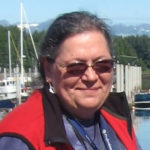A good neighbor reflects on the art of listening

Patience Andersen Faulkner creates beautiful beadwork, leatherwork, hand-knitted items, traditional drums, and baskets among other artistic endeavors.
But she is also a lifelong student of the art of conversation. Only a few minutes into a chat, and the listener feeling valued, respected, and entertained.
An Alaska Native elder born in Cordova, she grew up in northern Minnesota, raised by Scandinavians.
“They’re feral, you know,” she jokes. But she adds “that culture strongly valued family, social contacts, and community commitment.”
She married a career soldier. They moved around a lot with their kids.
Everywhere they went, the “social butterfly,” as she calls herself, embraced new cultures and made new friends.
“None of us had any money, but we sure as heck could help our neighbor if they needed something.”
While giving the proverbial cup of sugar to a neighbor was important, she says that allowing others to help in return was important too.
“People were learning skills to be good adults,” she recalls. “It was a two-way street, we needed each other for many reasons, but we also helped each other for many reasons.”
Preserving knowledge of traditional culture and crafts
Patience’s inquiring mind has led to an extensive knowledge of traditional crafts.
“I’m always curious about things,” she says. As a child, her relative’s hands were always busy knitting or crafting. Patience watched and learned.
“If it’s not labor-intensive, I don’t want to it.”
When she moved back to Cordova in 1976, she was captivated by the traditional crafts of Native Alaskans.
“It took me a while to develop friendships and trust,” she says. “Eventually people would show me some of the items that their grandmother had made.” She wanted to know how things were made, but discovered that a lot of that knowledge had been lost.
She kept asking questions and researching, teaching herself. Now she loves sharing that knowledge.
“One of my favorite sports is teaching Native Alaskan art and culture. Other people have great ideas for color combinations, I show them some basic techniques and they just go wild with it. It’s beautiful!”
She has a personal theory of teaching which she calls “show one, teach one.” It grew out of her earlier life experiences.
“Whatever age you are, 4 to 94, I put each friend next to someone who has a little bit of experience.” Even if it’s something as basic as threading a needle, she encourages people to help each other learn.
“I grow crafters,” she says. “I’ve grown quite a few.”
She teaches 120-150 campers during Nuuciq Spirit Camp and around 40 students at Peksulineq Culture Week in Tatitlek. Both are held in Prince William Sound and celebrate the traditional culture of the Chugach region.
After a few years though, the Tatitlek program stopped asking her to teach.
“As it turns out, the people that were there instructing were ones I had taught a few years before, and they were now teaching.”
Growing listeners
One the Council’s earliest and most successful projects stemmed from work she was doing after the Exxon Valdez oil spill. She worked as a legal aide, helping Cordovans navigate the claims process.
“I listened to people’s impacts, and they would also tell me how this devastated them emotionally.” She noticed that when the conversation was over, they would walk away feeling better, with a sense of self-worth.
“They weren’t cured or anything, they didn’t have any more money, but at least they knew that they had a tool within themselves from which to draw.”
Patience convinced the lawyers she worked for in that some sort of mental health program was badly needed in Cordova. They put her together with Dr. Steve Picou, a sociologist at the University of New Orleans.
Dr. Picou and his researchers worked with Patience and other Cordovans to develop the Peer Listening Program. The Council ended up sponsoring the program as part of its guide for communities dealing with an oil spill, Coping with Technological Disasters.
The program trains local residents to provide peer support in disaster-impacted communities where formal mental health facilities may not be available. The program, updated through the years, has helped residents after hurricanes and oil spills around the nation and world.
Volunteering for the Council
Patience has been a member of the Council’s Board of Directors for the past 23 years, making her the longest-serving Council member. She represents the Cordova District Fishermen United. She currently serves on several committees: Information and Education, Long Range Planning, and Board Governance. She has served as president for several terms as well as other elected officer positions on the Executive Committee at various times. She hopes to inspire others to volunteer.
“I like to be a cheerleader.”
Patience says it’s important for the Council’s members to engage with the communities, to talk to other people, to listen to their concerns and solutions.
“That way we can become a better organization and maintain the longevity that we have to be there.”
Links
- You can find more information about the Peer Listener program and the Coping with Technological Disasters Guidebook here: Guide for dealing with an oil spill
- Patience was interviewed in 2014 about her experience as a legal aid in Cordova after the Exxon Valdez oil spill. That interview is archived on Project Jukebox, part of the University of Alaska Fairbanks’ oral history archive
- Board passes resolution honoring Patience Andersen Faulkner (May 2022)
- New Zealanders visit Alaska in search of Exxon Valdez lessons
- Council responds to Gulf of Mexico disaster (Article in PDF of July 2010 Observer newsletter)